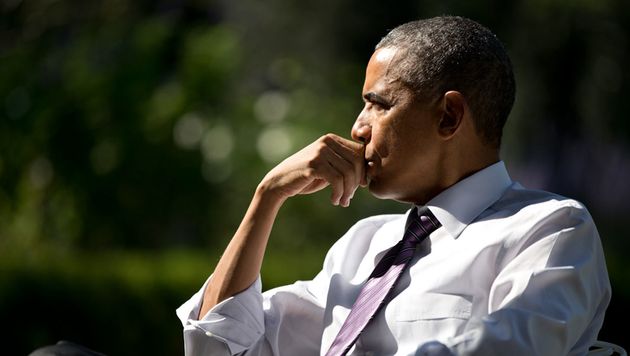Humanity’s collective memory recalls up to a certain point, when we found ourselves already breathing in this wondrous world.
 Barack Obama. / obamawhitehouse.archives.gov (CC0)
Barack Obama. / obamawhitehouse.archives.gov (CC0)
In his memoir Dreams from my Father, Barack Obama unveils something of the complex development of his identity.
Written before his political career started, in his early 30s, Obama narrates how he came to grips with both sides of his white and black family of origin, his journey through prejudices, complex relationships, and influences, and his early quest for the father figure.
Obama’s father left the family when he was 2-year-old, and he recalls the anecdotes he heard from his mother and grandparents about his father – his booming voice, self-assured manner, brilliant intellect – and his early effort as a boy to patch these stories into a coherent whole, to understand who his father was, and, as a consequence, who he was.
A scintillating glimpse of that mental journey occurs when Obama compares his personal background, explained by his mother with a family picture album, with a children’s book he had in his room, about the origins of the world.
The family album would explain to him “a tale that placed me in the center of a vast and orderly universe,” a tale about his father’s journey from Kenya to Hawaii, about how his father and mother met and fell in love, about how his father would leave to study at Harvard and then to serve his home Africa. Similarly, Obama recalls that
“the path of my father’s life occupied the same terrain as a book my mother once bought for me, a book called Origins, a collection of creation tales from around the world, stories of Genesis and the tree where man was born, Prometheus and the gift of fire, the tortoise of Hindu legend that floated in space, supporting the weight of the world on its back.” [1]
Obama’s parallel between his family history and the history of the universe struck me because of this. For him – and for all of us, even if we grew with both parents – early history is a matter of revelation.
It goes beyond our memory, and we need outside sources like our parents to tell us about our birth and what led to it. So is also the history of the world: humanity’s collective memory recalls up to a certain point, when we found ourselves already breathing in this wondrous world.
But to know what took place before our memory – what led to our collective birth and the formation of the universe – we can only be a matter of outside information.
The big question, then, is what source to trust. “What supported the tortoise? Why did an omnipotent God let a snake cause such grief? Why didn’t my father return?,” started to ask Obama some years later.
Obama could do some investigation to refine his mother’s picture of his father, and we can of course investigate nature for traces of our origins, but even then family trees and scientific evidence can tell us only a limited number of things.
We know, for example, that the universe came to be around 13.7 billion years ago, and most scientists believe that a big explosion called the Big Bang started it. But what caused the Big Bang? How could insurmountable mass and mind-boggling complexity come out of nothing?
Our memory doesn’t reach so far back, and our current investigation can only answer some of our long-asked questions.So what source should we trust? Who witnessed our creation and can explain it to us credibly?
As Obama’s children’s book hinted, this is a religious question. It can only be narrated by someone who was before we were, some form of intelligent life that predates humanity.
The origin of the universe and our origin and identity as humans can only narrated by a divine source, if there is one. It has to be outside revelation.
The next burning question – so what source to trust, among so many – can only be addressed in another post. But one thing we cannot set aside today or any other day: the quest for our origin and identity.
We may want to leave this unsettling question aside, but if we want to grasp our essential identity, and therefore our competency and potential, as individuals and as humans, we have to come to grips with our origin.
I imagine Obama’s journey would be very different had he settled for an unexamined life, for instance. Our sense of purpose, and meaning, and identity, and vocation, and beauty, and sacredness, depends on our grasp of how we came to be.
We have to reach beyond memory, wrestle with hard questions about ourselves and the world, and find the credible voice that allows us to understand our potential and live empowered by the image of our Father.
[1] Barack Obama, Dreams from my Father: A Story of Race and Inheritance (New York: Three Rivers Press, 2004), 10.

Las opiniones vertidas por nuestros colaboradores se realizan a nivel personal, pudiendo coincidir o no con la postura de la dirección de Protestante Digital.
Si quieres comentar o